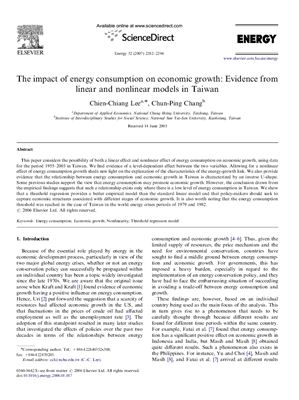На английском языке. Статья опубликована в ж. Energy, 2007, V. 32,
P.2082-2094.
This paper considers the possibility of both a linear effect and
nonlinear effect of energy consumption on economic growth, using
data for the period 1955–2003 in Taiwan. We find evidence of a
level-dependent effect between the two variables. Allowing for a
nonlinear effect of energy consumption growth sheds new light on
the explanation of the characteristics of the energy-growth link.
We also provide evidence that the relationship between energy
consumption and economic growth in Taiwan is characterized by an
inverse U-shape. Some previous studies support the view that energy
consumption may promote economic growth. However, the conclusion
drawn from the empirical findings suggests that such a relationship
exists only where there is a low level of energy consumption in
Taiwan. We show that a threshold regression provides a better
empirical model than the standard linear model and that
policy-makers should seek to capture economic structures associated
with different stages of economic growth. It is also worth noting
that the energy consumption threshold was reached in the case of
Taiwan in the world energy crises periods of 1979 and 1982.
Lee C.C., Chang C.P. The impact of energy consumption on economic growth: Evidence from linear and nonlinear models in Taiwan (Влияние потребления энергии на экономический рост: факты из линейной и нелинейной моделей в Тайване)
Топливно-энергетический комплекс
-
Аккумуляторы тепловой энергии
-
Альтернативная энергетика
-
Биотопливо, биоэнергетика
-
Бытовые холодильники
-
Ветроэнергетика
-
Водоподготовка
-
Водородная энергетика
-
Гелиоэнергетика
-
Геотермальная энергетика
-
Гидротехнические сооружения
-
Заземление и молниезащита
-
История энергетики
-
Качество электроэнергии
-
Котельные установки
-
Криогенная техника и технология
-
Малая гидроэнергетика
-
Математические задачи энергетики
-
Материалы конференций
-
Механическое и энергетическое оборудование
-
Монтаж, эксплуатация и ремонт электрооборудования
-
Надежность электроснабжения
-
Нормативно-техническая документация (НТД)
-
Опыт строительства гидроузлов
-
Основы электромеханики
-
Переходные процессы в электроэнергетических сетях
-
Периодика по ТЭК
-
Проектирование холодильных установок
-
Рабочие вещества холодильной и криогенной техники
-
Рабочие режимы гидроэнергетических систем
-
Релейная защита и автоматизация ЭС
-
Ремонт и монтаж холодильных установок
-
Светотехника и источники света
-
Справочники по кабельно-проводниковой продукции
-
Справочники по оборудованию
-
Справочники проектировщика
-
Теоретические основы электротехники (ТОЭ)
-
Тепло- и массообмен
-
Тепловая часть ТЭС, АЭС, ТЭЦ
-
Тепловые насосы
-
Тепловые сети
-
Теплообменные аппараты
-
Теплотехника
-
Термоэлектрическая энергетика
-
Техника высоких напряжений
-
Техническая термодинамика
-
Типовые проекты и решения
-
Топливо и теория горения
-
Холодильная и криогенная техника
-
Холодильные машины и аппараты
-
Холодильные технологии
-
Экономика энергетики
-
Электрические и теплотехнические измерения
-
Электрические и электронные аппараты
-
Электрические машины
-
Электрические системы и сети
-
Электрические станции и подстанции
-
Электромагнитная совместимость в электроэнергетике
-
Электромеханические системы
-
Электрооборудование бытовых приборов
-
Электропривод
-
Электроснабжение
-
Электротехнические материалы
-
Электротехнологические установки
-
Электроэнергетика
-
Энергетические системы и комплексы
-
Энергетический аудит
-
Энергетический менеджмент
-
Энергосбережение
-
Ядерная и термоядерная энергетика
Статья

- формат pdf
- размер 277,11 КБ
- добавлен 03 июня 2012 г.

